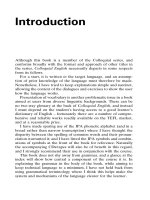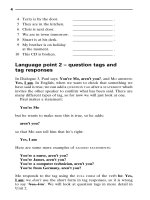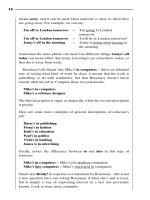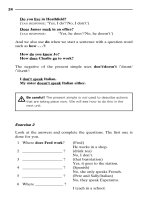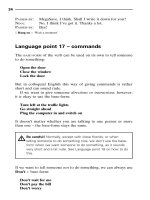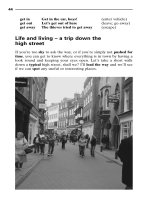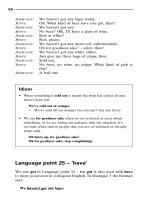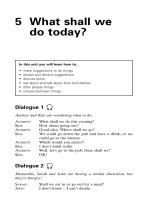Becoming a reflective english teacher
Bạn đang xem bản rút gọn của tài liệu. Xem và tải ngay bản đầy đủ của tài liệu tại đây (1.14 MB, 242 trang )
Edited by
Becoming a Reflective English Teacher
In a structured and practical way this book introduces you to the paradigmatic
and theoretical issues underpinning English teaching. Through its focus on the
significant aspects of the role of the English teacher, the book enables you to
consider not just the practice of English, but also a range of historical, social
policy and theoretical perspectives relating to the development and formulation
of English as a subject. Overall the book provides a detailed understanding of
the major foundations of English as an academic discipline, as well as what
this means for your teaching. Key features include:
● Professional reflection – targeted reflective activities
● M level tasks – designed to help develop strong and meaningful
connections between academic and practical components of the
teacher’s role
● Into Practice – opportunities to think about the practical application of
material in the book
Andrew Green is Senior Lecturer teaching English
PGCert, Masters and PhD programmes at Brunel
University, UK.
Cover design Hybert Design • www.hybertdesign.com
www.openup.co.uk
Green
This book supports students training to teach English in secondary schools, as
well as the professional development of teachers of English early in their
careers.
Reflective English Teacher
Becoming a Reflective English Teacher builds firm bridges between theory and
practice, exploring how these can be brought together to create powerful
contexts for teaching and learning across the broad spectrum of elements of the
English secondary curriculum. By combining both theoretical and practical
dimensions, the book enables you to reflect meaningfully on the processes and
impact of your teaching.
Becoming a
“This timely and valuable textbook will be of enormous help to students and
trainee teachers on a variety of courses and routes into the English teaching
profession. Its crucial emphasis on the importance of theory and reflection as
well as on practice represents a considered and powerful riposte to prevailing
reductive approaches to English teaching in our schools. I will certainly be
recommending it to my students.”
Andrey Rosowsky, Director of Initial Teacher Education,
University of Sheffield, UK
Andrew Green
Becoming a
Reflective
English Teacher
Becoming a Reflective English Teacher
Becoming a
Reflective English
Teacher
Edited by Andrew Green
Open University Press
Open University Press
McGraw-Hill Education
McGraw-Hill House
Shoppenhangers Road
Maidenhead
Berkshire
England
SL6 2QL
email:
world wide web: www.openup.co.uk
and Two Penn Plaza, New York, NY 10121-2289, USA
First published 2011
Copyright © Andrew Green 2011
All rights reserved. Except for the quotation of short passages for the
purposes of criticism and review, no part of this publication may be
reproduced, stored in a retrieval system, or transmitted, in any form or by
any means, electronic, mechanical, photocopying, recording or otherwise,
without the prior written permission of the publisher or a licence from
the Copyright Licensing Agency Limited. Details of such licences
(for reprographic reproduction) may be obtained from the Copyright
Licensing Agency Ltd of Saffron House, 6–10 Kirby Street, London,
EC1N 8TS.
A catalogue record of this book is available from the British Library
ISBN-13: 978 0 335 24289 4 (pb) 978 0 335 24290 0 (hb)
ISBN-10: 0 0335 24289 8 (pb) 0335 24290 1 (hb)
eISBN 978 0 335 24291 7
Library of Congress Cataloging-in-Publication Data
CIP data applied for
Typesetting and e-book compilation by
RefineCatch Limited, Bungay, Suffolk
Printed in the UK by CPI Antony Rowe, Chippenham
Fictitious names of companies, products, people, characters and/or data
that may be used herein (in case studies or in examples) are not intended
to represent any real individual, company, product or event.
Contents
List of figures
List of tables
List of contributors
List of abbreviations
1
ANDREW GREEN
vii
ix
xi
xv
1
Getting started
2
ANDREW GREEN AND JOANNA MCINTYRE
6
What is English?
3
PAULA ZWOZDIAK-MYERS
26
Reflective practice for professional development
4
JOANNA MCINTYRE AND ANDREW GREEN
43
Planning the curriculum
5
DEBRA MYHILL AND ANNABEL WATSON
58
Teaching writing
6
ANGELLA COOZE
73
Teaching reading
7
ROBERT FISHER
90
Dialogic teaching
8
BETHAN MARSHALL
110
Assessing English
9
MAGGIE PITFIELD
123
Drama in English
10
JENNY GRAHAME AND ANDREW GREEN
Media in English
140
vi
11
CONTENTS
VICKY OBIED
156
Knowledge about language and multi-literacies
12
RICHARD QUARSHIE
171
English and student diversity
13
GARY SNAPPER
185
Teaching post-16 English
14
LINDA VARLEY AND ANDREW GREEN
204
Academic writing at M level
INDEX
220
Figures
Figure 1.1
Figure 1.2
Figure 2.1
Figure 2.2
Figure 2.3
Figure 2.4
Figure 2.5
Figure 3.1
Figure 3.2
Figure 3.3
Figure 3.4
Figure 4.1
Figure 4.2
Figure 5.1
The cycle of teaching and learning
Interaction of standards
Key ideas from Leavis
Subject knowledge
Transactions in the English classroom
A tripartite division of inter-related subject knowledges
The four categories of subject knowledge for teaching
Dimensions of reflective practice
Kolb’s (1984) model of experiential learning
McKernan’s (1996: 29) model of action research
Qualitative distinctions between reflective conversations
A conceptual model of planning
Exemplar lesson planning pro forma
Simplified version of Hayes and Flower’s (1980)
model of the writing process
Figure 6.1
The simple view of reading
Figure 6.2
National strategies: suggested pedagogic approaches
Figure 6.3
Working with gifted readers
Figure 6.4
Planning for reading
Figure 7.1
Question quadrant
Figure 9.1
Diamond twelve
Figure 14.1 Cycle for writing
Figure 14.2 Effective writing checklist
2
4
12
14
15
18
21
28
29
30
36
53
54
60
78
84
85
86
103
136
206
218
Tables
Table 3.1
Table 4.1
Table 4.2
Table 5.1
Table 6.1
Table 6.2
Table 6.3
Table 6.4
Table 7.1
Table 7.2
Table 7.3
Table 7.4
Table 7.5
Table 7.6
Table 8.1
Table 13.1
Table 13.2
Types of question related to specific types of qualitative discourse
Levels of planning
Common mistakes in planning
Students’ reflections on their composing processes
Four key resources
Models of reading
Working with readers in secondary school
Reading and inclusion
Traditional vs dialogic teaching
Dialogic processes and questions to ask
Information processing and dialogic questions
Critical thinking and dialogic questions
Creative thinking and dialogic questions
Alternatives to questions
Example of Year 10 peer assessment
Approaches to post-16 English literature
Approaches to post-16 English language
38
53
55
68
77
80
82
86
93
95
96
96
97
100
117
194
200
Contributors
Angella Cooze is Senior Lecturer in the School of Education at Swansea
Metropolitan University. She is Subject Leader for the PGCE English course and
Strand Manager for the MA(Ed) EAL strand. Angella is also module leader for both
the Language and Learning and ESDGC MA(Ed) modules. She also contributes to
a number of other courses, primarily in the areas of literacy, language acquisition and
development, English as an additional language, diversity, and research methods. Prior
to this, she enjoyed teaching English at schools in South Wales. Her research interests
include English as an additional language, literacy, and philosophy for children. She
is the author of 100 Tips for Teaching English, 100+ Ideas for Teaching English and 100
Ideas for Trainee Teachers.
Robert Fisher taught for more than twenty years in schools in the UK, Africa and
Hong Kong and was head of a primary school in Richmond. He has published more
than thirty books on education, including Teaching Children to Think, Teaching Children
to Learn, Teaching Thinking, the Stories for Thinking series, and Creative Dialogue. His
books have been translated into thirteen languages. He was awarded a PhD for research
into philosophy for children. He was a professor of education at Brunel University, and
since retiring is a conference speaker and educational consultant on teaching thinking,
dialogic learning and creativity. He also cultivates his own creativity through art, sculpture, poetry, music and Argentinian tango. He has a website at www.teachingthinking.
net and a blog featuring his art and poetry.
Jenny Grahame taught media in London comprehensives for many years. She is
Media Consultant at the English and Media Centre, London, where she delivers continuing professional development, writes teaching resources, and edits MediaMagazine
for 16+ media and film students. She has developed continuing professional development and initial teacher education courses in media education from Key Stage 3 to
MA level for local authorities and higher education institutions, including a National
Strategy training package for media in English at Key Stage 3. She has devised classroom publications from Key Stage 2 to A level including work on advertising, news,
TV drama, reality TV and short film, and has collaborated on many cross-curricular
xii
CONTRIBUTORS
research projects in partnership with TDA, QCA, Gulbenkian, Esmee Fairbairn and
CSCYM. She is a founder member of the Media Education Association.
Andrew Green is Senior Lecturer in English Education at Brunel University, where
he leads the PGCert in Secondary English Education. He also teaches on Masters and
PhD programmes. Recent books are Starting an English Literature Degree, Transition
and Acculturation, Frankenstein and Wuthering Heights. He is also the author of
numerous literary articles, A level student text guides and A level resources, as well
as academic papers on the subject of English A level and higher education English.
Prior to commencing his role at Brunel, he taught in a range of secondary schools in
Oxfordshire and South London.
Joanna McIntyre is Lecturer in English Education at the University of Nottingham
where she is a member of the Centre for Research in Schools and Communities
(CRSC). At the University of Nottingham, and in her previous position at Nottingham
Trent University, Jo has taught on a range of initial teacher education programmes,
including PGCE, GTP and Teach First. She also teaches on the Masters in Education
programme. Previously, as a teacher of English, a head of department and an Advanced
Skills Teacher, she developed a strong philosophy about the importance of English to
students as a means of personal expression, developing cultural values, critical enquiry
and fostering creativity. This has led to an interest in research which focuses on narrative. Jo has worked on a range of funded research projects and is particularly interested
in research on the discourses surrounding schools and the teachers that work in them,
the lives of both long-serving and beginner teachers, and approaches to mentoring.
Bethan Marshall is Senior Lecturer in the Department of Education and Professional
Studies at King’s College, London. One of her major areas of interest is in the competing philosophies or models of English as a subject and how these impact on policy.
She is currently researching the way in which English teachers’ philosophies of their
subject change over time. She is also concerned with the relationship between assessment and learning, with particular reference to English, a subject on which she has
published widely, as well as the relationship between film and television and pupils’
developing literacy.
Debra Myhill is Professor of Education at the University of Exeter, and is Acting
Dean for the College of Social Sciences and International Studies. She leads the
PGCE Secondary English programme and her research interests focus principally on
aspects of language and literacy teaching, particularly writing and grammar, and talk
in the classroom. She has led three ESRC-funded research projects; one on talk for
learning and two on writing (Patterns and Processes, and Grammar for Writing) and
one funded by Esmee Fairbairn (From Talk to Text); co-convened an ESRC Research
Seminar series ‘Reconceptualising Writing’; and given research presentations at
numerous conferences, national and international, for both professional and research
communities. She is the author of Better Writers, and co-editor of Talking, Listening,
Learning: Effective Talk in the Primary Classroom, Using Talk to Support Writing and the
Handbook of Writing Development.
Vicky Obied is Lecturer in Secondary English with Media and Drama on the PGCE
programme at Goldsmiths. She also works on the Masters in Education: Culture,
CONTRIBUTORS
xiii
Language and Identity and the MPhil/PhD programme in the Educational Studies
Department. She is a committee member of the Centre for Language, Culture and
Learning at Goldsmiths. Her expertise is in language development, and her doctorate research was in the area of language and literacy and applied linguistics. Vicky’s
research interests lie in biliteracy and biculturalism, and poetry. A key area of her
research is an analysis of cultural perspectives in relation to literacy, and the conflicts
which might arise from contrasting cultural and social practices. Her research interests
also include the literacy development of bi- and multi-lingual students in mainstream
classes.
Maggie Pitfield is Lecturer in Secondary English with Media and Drama on the
PGCE programme at Goldsmiths. Maggie jointly co-ordinates the Flexible PGCE
programme and is also Deputy Head of the Department of Educational Studies. She is
a committee member of the Centre for Arts and Learning at Goldsmiths. A key area of
research interest is drama in the English curriculum, although she has also published
on flexible learning models in initial teacher education. Prior to joining Goldsmiths
in 2002, Maggie taught drama and English, and latterly media studies, in London
secondary schools, a career spanning twenty-four years. She has had considerable
experience as a Head of English. She was Chair of Harrow Teachers’ Consultative
Committee for a number of years, and was a member of the now disbanded BBC
English Education Consultative Group.
Richard Quarshie is Programme Leader for Secondary PGCE and GTP English
at the Cass School of Education, University of East London. He taught English for
twenty-two years in London comprehensive schools, and for eight years was Head of
the Department of English and Media Studies at Stoke Newington School, Hackney.
He first moved into initial teacher education at the University of London Institute
of Education, where he taught for five years before taking up his present post. He is
a former Chair of the Multicultural Committee of the National Association for the
Teaching of English. His research interests include autobiography, learner autonomy,
and linguistic and cultural diversity in English.
Gary Snapper was Head of English at Impington Village College, Cambridge. He
is currently a Research Associate in the School of Education at Brunel University,
the editor of NATE’s professional journal English Drama Media, a teacher of A level
English at the Cheney School in Oxford, a member of NATE’s Post-16 Committee,
and a freelance consultant. He recently completed doctoral research into the transition
between sixth form and university English, and is planning further research into and
writing about the history, theory and practice of post-16 English.
Linda Varley taught and examined A level English and language before joining the
University of Manchester in 2002 as a PGCE tutor and course director for an MEd
course on the teaching of English. She is currently Joint Programme Manager for
the Teach First North West PGCE programme, which she combines with her role as
Professional and English Subject Tutor. She is Lead Subject Studies Tutor for English,
co-ordinating the English Subject Studies programme nationally. She took a lead role
within Teach First in implementing the transition of QTS ITT to PGCE and moving
mentors and tutors to M level. Her research interest is the 1944 Normandy Campaign,
xiv
CONTRIBUTORS
and she has designed and resourced a website for Normandy veterans, recording their
first-hand experiences.
Annabel Watson is a PhD candidate at the University of Exeter, UK, working on a
large-scale ESRC-funded project investigating the impact of contextualised grammar teaching on the development of students’ writing at Key Stage 3. Her particular
area of study is the relationship between teachers’ beliefs and pedagogic practices.
Her wider research interests include multi-modal literacy and the teaching of writing.
She teaches on various courses in the Graduate School of Education at Exeter, and is
responsible for the media element of the English with Media Secondary PGCE.
Paula Zwozdiak-Myers is Lecturer in Education at Brunel University. She is an
experienced teacher, teacher educator, researcher and writer of educational materials.
She has worked in urban and rural secondary schools in England. She has a particular interest in inclusion and special educational needs (SEN), and leads a specialist
SEN strand at Masters level, focusing on difference and diversity, the promotion of
individual potential and entitlement, and the meanings of inclusion as a philosophical,
socio-cultural, political and educational agenda. Her current major research focuses
on reflective practice for professional development in teacher education. Other areas
of interest include qualitative approaches to research, partnership working in initial
teacher education, interpersonal relationships and communication skills, and dance
and movement studies.
Abbreviations
AF
AFL
APP
CR
EAL
ERA
ESRC
ETUCE
FHEQ
HE
IB
ICT
ITE
JMB
KAL
KS
LATE
LEA
LINC
LSA
MFL
NAGTY
NATE
NCC
NEAB
NLS
NQT
OECD
PIRLS
PNI
POS
assessment focuses
Assessment for Learning
Assessing Pupils’ Progress
collaborative reasoning
English as an additional language
Education Reform Act
Economic and Social Research Council
European Trade Union Committee for Education
Framework for Higher Education Qualifications
higher education
International Baccalaureate
Information and Communications Technology
Initial Teacher Education
Joint Matriculation Board
knowledge about language
Key Stage
London Association for the Teaching of English
Local Education Authority
Language in the National Curriculum
learning support assistant
modern foreign language
National Academy of Gifted and Talented Youth
National Association for the Teaching of English
National Curriculum Council
Northern Examination Association Board
National Literacy Strategy
newly qualified teacher
Organisation for Economic Co-operation and Development
Progress in International Reading Literacy Study
positive, negative, informative
programmes of study
xvi
QTS
S&L
SEN
TDA
VLE
A B B R E V I AT I O N S
Qualified Teacher Status
speaking and listening
special educational needs
Training and Development Agency
virtual learning environments
1
ANDREW GREEN
Getting started
Introduction
Welcome to the exciting and challenging world of teaching English. Whatever else they
may be, the course of teacher education you are about to enter and your future career
as a teacher of English in secondary school will never be dull. Every lesson you teach,
every student you come into contact with, every new concept you try to impart will
throw up new challenges for you. It is in working through and reflecting upon these
events and challenges that you will develop as a teacher, and it is in this very process
that the greatest rewards of teaching are to be found.
This book is built on the principle that the practice of teaching is more rewarding
and robust when it is founded on sound academic foundations. Theory and practice
interconnect, and it is the purpose of this book to help you understand how. Theory
that does not relate to practice is empty content, but by the same token practice that
takes no account of theory is like shooting in the dark. With this principle in mind,
reflection is a major focus of this book, as it is through reflection that you will be able
to develop your sense of how theory feeds into practice. It has a central role to play in
the cycle of teaching and learning (see Figure 1.1).
This diagram illustrates the cyclical nature of the teaching and learning process.
Planning takes place in preparation for teaching. Once teaching has taken place (or
while it is taking place), teachers reflect on their practice and evaluate its impact on
learning. Evaluation feeds further cycles of planning to inform teaching and learning,
and so on. The reflection required will be of different types depending upon the situations you are facing:
•
•
•
•
Personal – think about the relationships you are developing with students and a
variety of colleagues
Professional – consider the meaning of professionalism and what this constitutes
within the school environment
Academic – seek to develop your understanding of your subject
Pedagogic – explore the wide range of ways in which learning can be mediated
and enhanced.
2
BECOMING A REFLECTIVE ENGLISH TEACHER
Figure 1.1 The cycle of teaching and learning
Throughout this book you will find activities designed to help you in this process. Each chapter addresses a significant aspect of your work as a teacher of English.
These are varied in their focus to reflect the diverse and continually developing nature
of English in schools. Since 2009 there have been significant political and curricular
changes to English – the abolition of the Key Stage (KS) 3 SATs, new specifications
for GCSE and A level, the inauguration of a new National Curriculum, and so on – and
the nature of English as a discipline is also changing to take account of new literacies,
developments in Information and Communications Technology (ICT), changes in the
ways in which readers consume and relate to text, and so forth. With this in mind, the
need for teachers to be critically reflective has, perhaps, never been more pronounced.
The structuring of the chapters in this book is designed to reflect the constantly
changing nature of the subject and the demands this places on those training to teach
it. Some are based on enduring subject matter for teaching (e.g. Chapter 9, ‘Drama
in English’; Chapter 10, ‘Media in English’; Chapter 11, ‘Knowledge about language
and multi-literacies’; and Chapter 13, ‘Teaching post-16 English’); others are based on
the modalities of language, the issues we face when teaching processes in these areas,
and the ways in which they may operate in the classroom (e.g. Chapter 5, ‘Teaching
writing’; Chapter 6, ‘Teaching reading’; and Chapter 7, ‘Dialogic teaching’); a third
set consider broader aspects of teaching (e.g. Chapter 4, ‘Planning the curriculum’;
Chapter 8, ‘Assessing English’; and Chapter 12, ‘English and student diversity’); a final
group of chapters looks at other aspects of your career experience (e.g. Chapter 2,
‘What is English?’; Chapter 3, ‘Reflective practice for professional development’;
Chapter 4, ‘Planning the curriculum’; and Chapter 14, ‘Academic writing at M level’).
Through a close consideration of these and other issues, you will be introduced
to the theories and concepts underpinning the practice of English within the contemporary classroom. Practice is always more robust, and reflection more thorough when
theoretically informed. By engaging with a range of relevant policy and theoretical
perspectives, your ability to locate, rationalise and understand your own practice will
be enhanced.
Masters level
The nature of Initial Teacher Education (ITE) has undergone a change. In response
to the Bologna Agreement (1999), the National Framework for Higher Education
G E T T I N G S TA R T E D
3
Qualifications (FHEQ) in 2001 made it clear that ‘postgraduate’ must be postgraduate
not only in terms of time (i.e. completed after graduation from a first degree), but also
postgraduate in terms of content (i.e. study must be at a level beyond undergraduate study in the relevant discipline). In the case of PGCE qualifications, therefore,
students should engage with the discipline of education at Masters level. Most ITE
courses now provide at least the option for students to gain Masters level credits in the
course of their studies, and in most cases this is now the expectation. Students opting not to or failing effectively to complete the Masters level components of courses
in ITE can no longer be awarded a postgraduate certificate, but will receive instead
a professional certificate, assuming they meet the requirements of the Standards for
Qualified Teacher Status (QTS).
Along with changing political agendas with regard to higher education (HE),
school and training agendas have also developed. There is now a general thrust
towards teaching becoming a Masters level profession. This is reflected not only in
the provision of ITE courses in HE, but also in the Standards for QTS with their
focus on knowledge and understanding, and in the ongoing Standards for Professional
Development, against which all teachers now work. These embody a substantial component of professional reflection and require demonstrable criticality in developing
practice. It is the purpose of this book to help introduce you to the process and
to provide constructive ways of building bridges between academic and practical
elements of your ITE through a sequence of Masters level activities related to elements
of practice and through the development of robust models of reflective practice.
Sound academic practice and reflective criticality are, of course, foundational
for effective teaching. The QTS Standards engage with reflective practice as a
model for professional and personal development, and in that sense these Standards
also embody the Masters level agenda. Teachers have to demonstrate engagement
with their subject and its pedagogy in a sustained and critical way as part of their
everyday role. The Standards state that teachers must have ‘a creative and constructively critical approach towards innovation, being prepared to adapt their practice
where benefits and improvements are identified’. This takes us beyond a model
based simply on professional competence and into the realms opened up by Masters
level study. Such engagement with education as a discipline is mirrored in the
FHEQ descriptor for Masters level, which calls for teachers to have ‘a critical awareness of current problems and/or new insights, much of which is at, or informed by,
the forefront of their academic discipline, field of study, or area of professional
practice’.
Standards for QTS
The successful achievement of QTS depends upon the fulfilment of a set of
33 Standards. These are divided into three sub-sections: Professional Attributes
(Q1–Q9), Professional Knowledge and Understanding (Q10–Q21) and Professional
Skills (Q22–Q33). These subdivisions reflect the complex inter-relationship between
differing components of the teacher’s role. The first section covers the personal and
professional qualities that underpin effective teaching and learning, the second deals
with more numinous issues of knowledge and understanding and looks at a range of
4
BECOMING A REFLECTIVE ENGLISH TEACHER
Figure 1.2 Interaction of standards
factors underpinning effective work within the classroom, and the third focuses on the
practical operation of the classroom and the processes this entails.
While in one sense these professional Standards need to be considered
discreetly – each Standard is a unit for assessment in its own right – the bigger
picture is, of course, far more complex, and the three areas of the Standards frequently
overlap, as Figure 1.2 illustrates. It is impossible, for example, to implement effective
processes for assessment (a professional skill) without having a detailed knowledge
and understanding of the philosophies and the processes that underpin assessment
(professional knowledge and understanding) and without having a clear commitment
to developing students’ experience as learners of English and developing appropriate
contexts within which this can occur (a professional attribute). The most powerful
practice, and therefore the best teaching and learning, resides in the central section of
the diagram, where all three aspects of the teacher’s work coincide. The Standards cannot all be evidenced in the same way, however. It is important from early in your thinking about the Standards that you are aware of the explicit differences between them.
Key features
In order to help you develop your own reflection and to further your thinking about
the issues covered in each chapter, the following key features can be found throughout
the book:
1. Introductory boxes: outlining the major issues that will be covered in order to
begin your thinking processes and to indicate the range of coverage for easy
reference.
G E T T I N G S TA R T E D
5
2. Summary boxes: a summary of key points; these will provide final thoughts on the
issues that have been covered.
3. Recommended reading lists: a selection of relevant books, journal articles, websites and other sources relating to the matter covered in the chapter; these lists will
focus on texts at Masters level to assist you in targeting your wider reading and in
preparing for both the practical and the academic elements of your work.
4. Professional reflection: targeted reflective activities (e.g. reflection on practice or
practical scenarios, auditing activities, self- and peer-assessment, observation and
evaluation activities, and readings to feed into thinking about practice).
5. Masters level tasks: designed to help you develop strong and meaningful connections between academic and practical components of your studies (e.g. summaries of key concepts, digests about key thinkers, application of theory to practical
teaching contexts).
6. Into practice: opportunities to think about the practical application of what you
have read (e.g. planning exercises, devising assessment tasks, developing a range
of resources, trying out certain activities personally).
There are certain issues in teaching that are of general professional significance and
underpin your work as a teacher. These are often known as cross-curricular issues. In
order to reflect this, there are feature boxes addressing these issues in most chapters
to allow you to think about how these matters affect your practice in a range of areas
and ways:
1. Inclusion (special educational needs [SEN]/inclusion/gifted education): These
features will guide your thinking in relation to a range of student needs, from the
most to the least able. They will focus your attention specifically on the issues
underlying students’ particular needs and the practicalities of meeting these (e.g.
What are the particular issues in working with gifted students on writing?)
2. English as an additional language (EAL): It is difficult to deal generically with
issues of EAL, as the needs of EAL learners vary very specifically from one language to another. There are, however, some general principles, and these boxes
will focus your thinking – what, for instance, may be the particular difficulties an
EAL learner may face with drama?
3. ICT: ICT has a binary role in the English classroom. It is a pedagogic tool that
opens up a wealth of opportunities in the classroom, but it is also an area of cognitive content for teaching. This feature provides activities and ideas relating to
both.
4. Creativity: This is designed to develop creative thinking about how to teach
English, providing you with a range of innovative ways of thinking about doing
English in the classroom. More general issues about the role of creativity within
learning and of ways of understanding creativity will also be addressed.
Happy reading and reflection.
2
ANDREW GREEN AND JOANNA MCINTYRE
What is English?
In this chapter you will consider
•
•
•
•
the background of English as an academic discipline;
personal experiences of English teaching;
the role of the English teacher; and
what constitutes subject knowledge for teaching.
Introduction
What is English? It may seem a simple question, but the answer is in fact far from
straightforward. Is it a language, a subject or a people? A noun or an adjective? If we
accept it is a subject for study, does its content deal solely with language or does it also
incorporate literature, media, spoken text, ICTs and so on? If it incorporates literature,
who decides which books are considered of sufficient literary merit? Issues of nationhood and the legacy of Empire are also encoded in the subject in ongoing debates
about whether English literature means works written solely by authors from England,
or by any author writing in English (e.g. Canadians, Australians, New Zealanders,
Americans, South Africans, Caribbean writers and so forth). And what about literature in translation or studied in its original language? Why the presence of the troublesome adjective ‘English’, which implies a certain distinction from the rest of the world?
The idea of what constitutes English, then, is not as simple as it may at first appear.
Nor is the history of the subject. The subject’s place in the curriculum was hard won,
due in part to the subject’s awkward status as medium as well as object of study, a
debate that is still rife in the battle between subject skills and subject content. In short,
English has always been and continues to be something of a political football, and as
such it is a subject fraught with social, national, religious, philosophical and political
ideology. And every day the subject is developing and mutating, taking on new words,
new media and associated methods of textual production and reception, shaping itself
to new social and political forces, stretching to incorporate new works of literature
and cinema. The list could go on. Suffice it to say that great challenges and great
W H AT I S E N G L I S H ?
7
rewards await those engaged in teaching this most vibrant, dynamic and troublesome
of subjects.
With all this in mind, it is very important for you to spend some time coming to an
understanding of where your subject comes from, what it involves, and how you as a
practitioner respond to these shaping forces. Perhaps it is useful to begin by considering how you and others around you view teachers in general and English teachers in
particular.
Creativity: anatomy of an English teacher
Speak to as many non-teachers as you can about the kind of person they think of when
they imagine an English teacher. On the basis of their replies, draw a caricature of the
archetypal English teacher and label it. What are their characteristics? What do they
wear? What do they look like? Is this caricature a fair representation? Is this what you
want people to think of you?
Now jot down the characteristics you would like to display to your students.
History of English as a subject
It is sometimes a revelation to beginning teachers that there was a time before a statutory prescribed curriculum for English. Simply because the English language (in some
form) has been around for over 1,400 years, and because there is an extensive body
of literature covering the language’s entire history, it is easy to assume that English as
a subject has also existed for a long time. The history of English as a subject, however,
has been short and turbulent. Debates and battles about what should constitute a curriculum for English are as old as the subject itself.
Professional reflection: your experiences of English
Think back to your own study of English in school. Make a list of any significant events
or issues that had an impact upon how you were taught. How did these influence your
experience of English? Can you link these to wider social, historical or political changes
that were going on at the time?
One of the first key markers in the development of the subject was the 1835
English Education Act. Set against the background of Victorian colonial expansion,
this Act officially required Indians to study in English and to study works of English
literature. English was seen as ‘civilising’. Member of the Supreme Council of India
T.B. Macaulay in a political Minute of 2 February 1835 perfectly captures the tone of
the age, its pride, arrogance and missionary zeal:
We have to educate a people who cannot at present be educated by means of
their mother-tongue. We must teach them some foreign language. The claims of
8
BECOMING A REFLECTIVE ENGLISH TEACHER
our own language it is hardly necessary to recapitulate. It stands pre-eminent
even among the languages of the West. It abounds with works of imagination not
inferior to the noblest which Greece has bequeathed to us, with models of every
species of eloquence, with historical composition, which, considered merely as
narratives, have seldom been surpassed, and which, considered as vehicles of ethical and political instruction, have never been equalled, with just and lively representations of human life and human nature, with the most profound speculations
on metaphysics, morals, government, jurisprudence, trade, with full and correct
information respecting every experimental science which tends to preserve the
health, to increase the comfort, or to expand the intellect of man. Whoever knows
that language has ready access to all the vast intellectual wealth which all the wisest
nations of the earth have created and hoarded in the course of ninety generations.
It may safely be said that the literature now extant in that language is of greater
value than all the literature which three hundred years ago was extant in all the
languages of the world together.
(Macaulay 1835, in Bureau of Education 1920)
Having established the principle in the colonial context, English (and specifically
literature) was introduced as a mechanism of social cohesion in the English context
when it was felt that religion no longer fulfilled this function; it was ‘literally the poor
man’s Classics’ and was introduced in ‘the Mechanic’s Institutes, working men’s colleges and extension lecturing circuits’ (Eagleton 1983: 23). So, from its inception,
the subject English has had a social and political purpose. Over time, these social and
political purposes have shifted in response to differing claims on the place of English
within the curriculum.
In 1851, the poet Matthew Arnold, one of the first of Her Majesty’s Inspectorate
for schools, campaigned for the place of English within the curriculum (and particularly the study of literature) of the new state education system. Again, it was thought
that literature could be used as a mechanism for bringing civilising influences and culture to the masses. However, Arnold railed against the emphasis on examination skills,
which he believed stifled creativity. Marshall argues that ‘Arnold’s legacy, his desire to
use culture to oppose the mechanistic, is the progenitor of competing traditions in the
fight to establish English on the curriculum’ (2000: 22).
Towards the end of the century, the debate over English surfaced once more. The
study of English was by now entering the universities, but was largely confined to the
study of linguistics and philology. Literature was still not seriously considered as a
subject for study. In 1887 Henry Nettleship published The Study of Modern European
Languages and Literatures in the University of Oxford in which he argued the inferiority
of English literature compared to the classics. Writing in 1891, however, J.C. Collins
in The Study of English Literature offered the view that literature provided ‘moral and
aesthetic’ education.
The Newbolt Report (1921), produced in response to questions about the function of state education in a country recovering from the First World War, again promoted the role of English as a driver for social unity and claimed that literature and
art had the potential to develop the human character and to help lead ‘the bulk of

